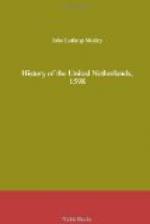The approach of the English ambassador, accompanied by the Chancellor of France and several other persons, soon brought the interview to a termination. Barneveld then presented several gentlemen attached to the mission, especially his son and Hugo Grotius, then a lad of fifteen, but who had already gained such distinction at Leyden that Scaliger, Pontanus; Heinsius, Dousa, and other professors, foretold that he would become more famous than Erasmus. They were all very cordially received by the king, who subsequently bestowed especial marks of his consideration upon the youthful Grotius.
The same day the betrothal of Monsieur Caesar with the daughter of the Duke of Mercoeur was celebrated, and there was afterwards much dancing and banqueting at the castle. It was obvious enough to the envoys that the matter of peace and war was decided. The general of the Franciscans, sent by the pope, had been flitting very busily for many months between Rome, Madrid, Brussels, and Paris, and there could be little doubt that every detail of the negotiations between France and Spain had been arranged while Olden-Barneveld and his colleague had been waiting for the head-wind to blow itself out at the Brill.
Nevertheless no treaty had as yet been signed, and it was the business of the republican diplomatists to prevent the signature if possible. They felt, however, that they were endeavouring to cause water to run up hill. Villeroy, De Maisse, and Buzanval came to them to recount, by the king’s order, everything that had taken place. This favour was, however, the less highly appreciated by them, as they felt that the whole world was in a very short time to be taken as well into the royal confidence.
These French politicians stated that the king, after receiving the most liberal offers of peace on the part of Spain, had communicated all the facts to the queen, and had proposed, notwithstanding these most profitable overtures, to continue the war as long as her Majesty and the States-General would assist him in it. De Maisse had been informed, however, by the queen that she had no means to assist the king withal, and was, on the contrary, very well disposed to make peace. The lord treasurer had avowed the same opinions as his sovereign, had declared himself to be a man of peace, and had exclaimed that peace once made he would sing “Nunc dimitte servum tuum Domine.” Thereupon, at the suggestion of the legate, negotiations had begun at Vervins, and although nothing was absolutely concluded, yet Sir Robert Cecil, having just been sent as special ambassador from the queen, had brought no propositions whatever of assistance in carrying on the war, but plenty of excuses about armadas, Irish rebellions, and the want of funds. There was nothing in all this, they said, but want of good will. The queen had done nothing and would do nothing for the league herself, nor would she solicit for it the adherence of other kings and princes. The king, by making peace, could restore his kingdom to prosperity, relieve the distress of his subjects, and get back all his lost cities—Calais, Ardres, Dourlens, Blavet, and many more—without any expense of treasure or of blood.




